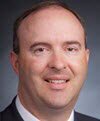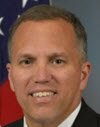January 13, 2016 | Marriott Metro Center | Washington, DC
The ATARC Federal Cloud Computing Summit was held on January 13, 2016 at the Washington Marriott at Metro Center in Washington, D.C. The MITRE-ATARC Cloud Collaboration Symposium featured discussion and white-boarding between government and industry subject matter experts in a small-group setting. The outcomes of these sessions will be compiled in a White Paper with recommendations to the government.
MITRE Chair

Justin Brunelle, Lead Application Developer, MITRE
CLOUD COLLABORATION SESSION CHALLENGE AREAS
1. Planning for Cloud Migration: Fail Early and Often
- How can we identify low-risk, high-reward legacy systems for cloud migration?
- How can we fail gracefully during migration, and learn from the failures?
- What tools can be incorporated into the migration process?
- How can we overcome the “loss of control” and licensing challenges of migration?
Government Lead

Jimmy Jones, Program Analyst, U.S. Department of Transportation
Industry Lead

Greg Mundell, Director of Sales, CliQr
MITRE Lead

Howard Small, Principal Software Systems Engineer, MITRE
2. Cloud O&M: Challenges and Solutions
- What is most suitable for private cloud versus Cloud Solution Provider management?
- How can current O&M processes shift to handle new developments in the cloud domain?
- Does current O&M need to change to take full advantage of cloud (and if so, how)?
Government Lead

Sara Mosley, Chief Enterprise Architect, Network Security Deployment Division, U.S. Department of Homeland Security/Program Manager, Trusted Internet Connections (TIC) Initiative
Industry Lead

Dr. Jeff Wootton, Senior Sales Engineer, Delphix
MITRE Lead

Mano Malayanur, Group Leader: Data Center Operations and Optimization, MITRE
3. Architecting Future Clouds
- How can the government adapt to the next disruptive cloud technology?
- What prediction mechanisms can help prepare government practitioners for adapting to new technologies?
- How can the government help direct the research and development of the next great cloud technology?
Government Lead

Greg Fritz, Project Director, U.S. Army
Industry Lead

Adam Alphin, Director, Supplier Enablement Services, Coupa
MITRE Lead

Duy Huynh, Senior Modeling and Simulation Engineer, MITRE
4. Adapting Cloud to Technology
- How can the government leverage other emerging technologies (e.g., IoT, mobile) to support cloud models (e.g., hybrid, private, public clouds)? How is cloud impacting the adoption of emerging technologies?
- How can networks (government-only and commercial) adapt to enable cloud interoperability?
- What is the role of cloud computing in the technology refresh cycle?
Academic Lead

Wu Feng, Director, SyNeRGy Laboratory/Professor, Department of Computer Science, Virginia Tech
Industry Lead

Chet Hayes, Chief Technology Officer, InfoZen
MITRE Lead

Demetrius Davis, Lead Systems Engineer, MITRE
5. Standards and Best Practices for Security and Privacy Management in the Cloud
- Discuss Security as a Service
- Discuss FedRAMP High Baseline and Trusted Internet Connections for application hosting in the cloud
- Identify security challenges and potential mitigations to software-defined networks that utilize clouds
- Identify benefits and challenges of security within government-only clouds (e.g., benefits of privacy versus challenges of commercial cloud provider interoperability)
Government Lead

Joe Paiva, Chief Information Officer, International Trade Administration
Industry Lead

Federico Simonetti, Founder and Chief Technology Officer, Extenua
MITRE Lead

Bob Natale, Principal Systems Architect, MITRE
RULES OF ENGAGEMENT
1. Participants come prepared to:
- Break out into teams
- Contribute and participate from specific domain/experience
- Write ideas on the table space whiteboard
- Share ideas and build off each other’s contributions
- Attend and complete session that you have signed-up
- Support the moderator and team members
- Create sets of best practices to support the event’s objectives and goals
- No business development
2. All discussed material must be publicly releasable
- No Classified discussions
- No proprietary discussions
3. None of the discussions or artifacts constitute Government direction, nor should be interpreted as official Government position
 The host organization is the Advanced Technology Academic Research Center. ATARC is a 501(c)(3) non-profit organization that provides a collaborative forum for government, academia and industry to resolve emerging technology challenges. ATARC also introduces innovative technology from academic research labs to the Federal government and private industry.
The host organization is the Advanced Technology Academic Research Center. ATARC is a 501(c)(3) non-profit organization that provides a collaborative forum for government, academia and industry to resolve emerging technology challenges. ATARC also introduces innovative technology from academic research labs to the Federal government and private industry.
